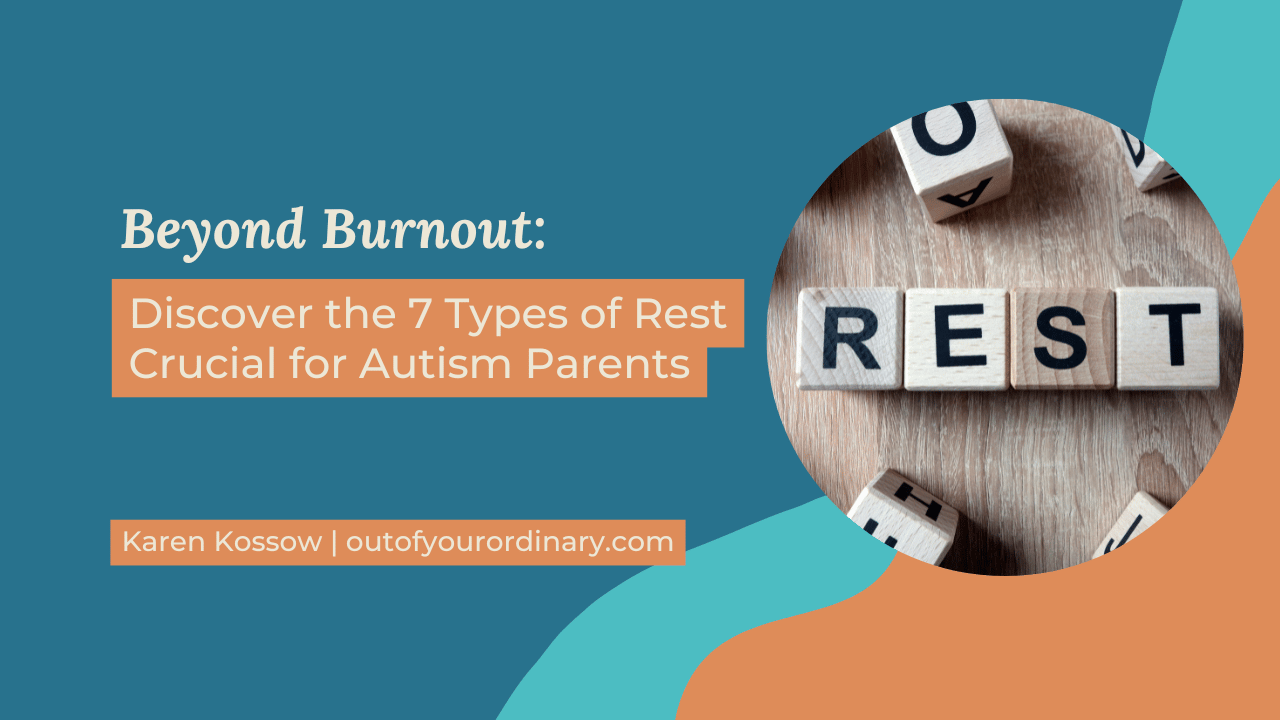Beyond Burnout: Discover the 7 Types of Rest Crucial for Autism Parents
Title text on a calming background, highlighting the 7 types of rest that help autism parents recover from burnout.
Originally Published: June 19, 2023
Updated: April 3, 2025
Parenting an autistic child can be incredibly rewarding, but it also comes with its fair share of challenges. Autism parents often find themselves juggling various responsibilities and can easily become overwhelmed and burnt out.
To sustain their well-being and continue providing the best care for their child, it's crucial that autism parents understand and prioritize the seven different types of rest.
In this blog post, we will explore the seven types of rest every parent needs - physical, mental, social, creative, emotional, spiritual, and sensory - and their importance in supporting autism parents.
Physical Rest
Physical rest involves allowing your body to recover and rejuvenate. This can include getting enough sleep, engaging in regular exercise, and taking breaks to rest and recharge throughout the day. Prioritizing physical rest helps you manage stress levels and maintain optimal physical health, two things that are very important for autism parents!
Mental Rest
Autism parents often deal with a constant stream of information, appointments, and decision-making. Mental rest involves giving your mind a break from cognitive activities. Set aside time for activities that promote relaxation and mental rejuvenation, such as meditation, mindfulness, or engaging in hobbies that bring you joy.
Social Rest
As an autism parent, it's common to devote significant time and energy to your child's needs. But nurturing social connections is vital for your well-being! Schedule regular social interactions with friends, family, or support groups to share experiences, seek advice, and receive emotional support.
Creative Rest
Engaging in creative activities can provide a much-needed outlet for self-expression and stress relief. Whether it's painting, writing, playing a musical instrument, or any other form of creative expression, allow yourself the time and space to indulge in activities that ignite your creativity.
And don’t feel like you have to include your child(ren) in this!
I know many parents who would love to indulge their creative passions, but feel like they should share the activity with their child. What ends up happening is they often don’t get around to ever doing it, for a variety of reasons. If helping your child(ren) participate in your chosen activity is preventing you from actually doing it, maybe it’s time to go it alone so you can actually get it done!
Emotional Rest
Caring for an autistic child can elicit a wide range of emotions, and it's important to acknowledge and address them. Emotional rest involves recognizing and processing your emotions in a healthy manner. Seek emotional support through therapy, support groups, or confiding in trusted individuals who can offer a listening ear and understanding.
Spiritual Rest
Nurturing your spiritual well-being can offer a sense of purpose and peace. This can involve engaging in practices aligned with your beliefs, such as meditation, prayer, mindfulness, or spending time in nature. Connect with what brings you inner peace and helps you find meaning in your journey as an autism parent.
Sensory Rest
Children on the autism spectrum may have sensory sensitivities, and sometimes, we don’t discover our own sensory sensitivities until we’re parenting them! As a parent, it's essential to be attuned to your own sensory needs. Sensory rest involves minimizing sensory overload and engaging in activities that provide sensory relaxation, such as taking a bath, listening to calming music, or enjoying nature.
Oftentimes, our children are loud…like Capital “L” loud. If you find yourself getting sound-sensitive and reactive to your child’s volume levels, it may be time to invest in some noise canceling headphones or earplugs for yourself. Some allow you to still hear what’s going on, but they lessen the amount of sound you can hear.
They were a lifesaver for me when my kids were younger.
Conclusion
Recognizing and prioritizing the seven types of rest - physical, mental, social, creative, emotional, spiritual, and sensory - is crucial for autism parents to prevent burnout and sustain their well-being. By incorporating these types of rest into your daily routine, you can nurture yourself as you raise your child and avoid the pitfalls that often befall parents of autistic kids.
Prioritize self-care, seek support when needed, and embrace the power of rest to navigate your autism parenting journey with resilience and renewed energy.
Is there something you’d like to add to the conversation? What types of rest have you found most helpful in your autism parenting journey?
Drop a comment below - I’d love to know what’s working for you and your family!
